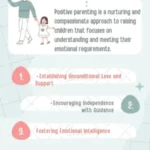Parenting is a journey full with obstacles, choices, and ongoing learning. In today’s society, when parenting techniques and ideologies vary significantly, one specific approach has provoked several arguments and discussions: rigorous parenting. But what does it mean to be a strict parent, and how does it affect a child’s upbringing? In this thorough book, we will dig into the realm of tough parenting, analyzing its advantages, pitfalls, and the significance of achieving a balance that develops both discipline and understanding.
Understanding Strict Parenting
Strict parenting, frequently characterized by clearly defined rules, high expectations, and regular punishments, tries to give structure and discipline in a child’s life. While the word “strict” may have a negative connotation, it’s crucial to explain that severe parents are not always dictatorial or unloving. Their aims are anchored in instilling a feeling of responsibility, respect, and achievement in their children.

The Benefits of Strict Parenting
Clear Limits:
Strict parenting is characterized by the establishment of clear limits and expectations for children. This deliberate approach aids in the early development of a child’s understanding of right and wrong. By having explicit boundaries, children in strict households gain a foundational comprehension of societal norms and ethical behavior from an early age.
Discipline:
Children raised in strict families exhibit notable qualities such as strong self-discipline, effective time management skills, and a robust work ethic. The structured environment created by strict parenting fosters a sense of responsibility and accountability in children, contributing to the cultivation of essential life skills.
Academic Success:
The adherence to high standards and rigorous routines within strict parenting environments often correlates with heightened academic success. Strict parents typically prioritize education and emphasize the importance of diligence and dedication to learning. Consequently, children from such backgrounds are more likely to excel academically due to the instilled values surrounding educational achievement.
Respect and Responsibility:
Strict parenting serves as a conduit for instilling fundamental values like respect for authority, responsibility for one’s conduct, and accountability. Children brought up with these principles are more likely to exhibit respectful behavior, understand the consequences of their actions, and embrace a sense of responsibility in various aspects of their lives. This forms the basis for the development of well-rounded and conscientious individuals.
The Drawbacks of Strict Parenting
Tension and Anxiety
Excessive strictness in parenting can inadvertently sow the seeds of tension and anxiety in youngsters. The constant fear of making mistakes or facing harsh repercussions becomes a persistent worry for children raised under such conditions. The atmosphere of strictness, rather than fostering a healthy environment for growth, can lead to heightened stress levels, impacting a child’s emotional well-being.
Rebellion
One notable outcome of a stringent parenting approach is the potential for rebellion among children. When faced with overly strict regulations, some youngsters may feel compelled to break free and rebel, engaging in actions that can be unsafe or contrary to parental expectations. The quest for freedom becomes a driving force, sometimes resulting in behaviors that are challenging for both the child and the parent.
Limited Creativity
The regimented nature of strict parenting environments poses a risk to a child’s creativity and problem-solving abilities. The imposition of rigid rules and stringent expectations may inadvertently stifle a child’s ability to think outside the box, limiting their capacity to explore innovative solutions and express their creativity freely.
Emotional Expression
Strict parenting often hinders the open expression of emotions in children. The fear of repercussions may lead children to believe that they need to suppress or repress their emotions, creating an environment where genuine emotional expression becomes challenging. This emotional constraint can have long-term implications, affecting a child’s ability to navigate and understand their own feelings and those of others.
Finding the Balance
While severe parenting has its virtues, it’s vital to establish a balance between punishment and understanding. Here are several techniques for establishing this equilibrium:
Effective Communication
In the realm of effective parenting, maintaining open and honest communication with your child stands as a cornerstone. A crucial aspect emphasized in parenting guidance is encouraging children to express their thoughts and emotions without the fear of condemnation. This creates an atmosphere where children feel heard, fostering trust and open communication.
Flexibility
Recognizing the evolving nature of parenting, a key principle is the acknowledgment that rules and strategies should adapt alongside a child’s growth and maturity. Being flexible in your parenting approach allows for the necessary adjustments to meet the shifting needs of your child at different stages of development.
Positive Reward
In the spectrum of disciplinary measures, positive reinforcement emerges as a powerful tool. Beyond employing punishments for misconduct, incorporating positive rewards for good behavior becomes integral. Praise and tangible incentives serve as motivational factors, encouraging children to consistently make positive choices.
Empathy
A fundamental trait instilled in effective parenting is empathy. Displaying empathy and compassion when your child encounters challenges fosters a deeper connection and support system. Empathetic responses not only enhance the parent-child relationship but also contribute to a child’s emotional well-being.
Quality Time
Amidst the various facets of parenting, spending quality time with your child remains a linchpin. Actively participating in activities they enjoy contributes to the building of a deep emotional connection. This connection becomes a crucial buffer, mitigating some of the potential negative impacts associated with a more stringent parenting approach.
In Conclusion
Strict parenting, when tempered with love, empathy, and efficient communication, may teach essential life lessons and prepare children for success. It’s crucial to acknowledge that there is no one-size-fits-all approach to parenting, and what works for one family may not work for another. Ultimately, the objective should be to produce responsible, polite, and joyful children who are able to tackle the difficulties of the world.
While strict parenting instills discipline and responsibility, an excessive approach risks tension and stifling creativity. Effective communication, flexibility, positive reinforcement, empathy, and quality time serve as crucial tools for achieving this balance. Ultimately, the goal is to raise well-rounded individuals equipped for life’s challenges, emphasizing that a harmonious blend of discipline and empathy forms the cornerstone of successful parenting.
Read also : Positive Parenting Techniques 101: A Comprehensive Guide to Transform Your Effective Parenting Journey





